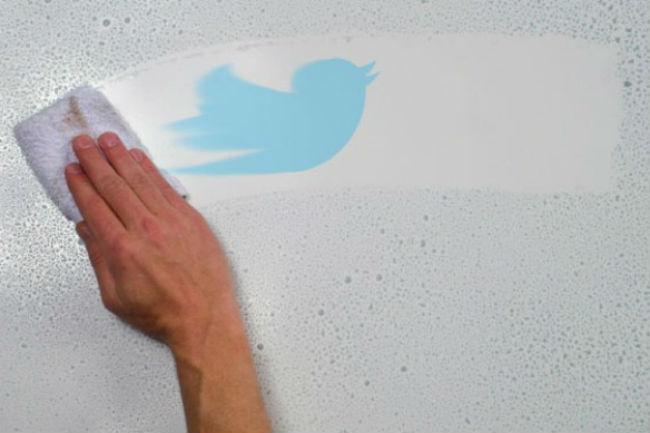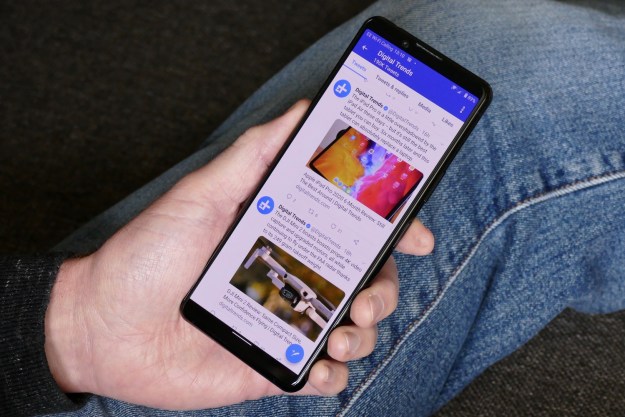
People will post embarrassing content on social media as long as we have two lips and the ability to make a duck face. But what if there was a way to predict which posts you’d find most regrettable down the line? Researchers are looking for ways to predict which tweets we want to delete, and if they figure it out, perhaps a customizable Humiliation Warning System isn’t too far off.
Right now there’s no way to tell whether you’ll be proud of your rousing 140 character defense of James Franco in a few years, or deeply, deeply ashamed. But hiding the evidence isn’t hard. Deleting a tweet is not a complicated process. If you don’t like what you wrote, you can trash it in a few clicks. And there are services like Tweet Delete that help you mass-delete older tweets.
That doesn’t mean, of course, that no one has read it; depending on how long you left the tweet up, most of the people that follow you may have seen it in their feed or when they looked at your account. For public figures, this means it’s difficult to erase a bad tweet, because fans, journalists, and interested parties will be sure to screenshot and otherwise preserve the faux pas. There’s even a website called Politiwoops devoted to chronicling the deleted tweets of politicians, and there used to be a project called Undetweetable that provided a searchable database of all deleted tweets, although it is now shut down. The habit of deleting tweets is intriguing because it underscores how people can make mistakes in crafting their digital identity, and how the instantaneous nature of Twitter dialogue can lead to posts that people regret.
So is there a way to predict which tweets will get deleted, or what kinds of tweets are seen as regrettable? Researchers at the University of Edinburgh set out to analyze why Twitter users delete their tweets, looking at whether most deleted tweets come from accounts that have been deactivated or made private, or whether they’re instances where a Twitter user just didn’t want whatever they wrote to continue existing. They looked at 200,000 deleted tweets and compared them to Twitter’s API to find out whether they came from deactivated or active accounts, and discovered that the vast majority come from active accounts, meaning most deleted tweets were genuine deletions, and did not come from spammers.
After the team confirmed that most tweets are deleted intentionally, they looked through those entries to see if there is a pattern when it comes to which tweets are most likely to be deleted. “Our manual analysis of the tweets discovered that a lot of deleted tweets contain curse words, leading us to examine the relationship between cursing and deletion in more detail,” the report states. The researchers posit that, because curse words are associated with negative emotions, users regret posting such negative content and attempt to remove it from their feeds.
Miles Osborne, one of the researchers, notes that there are a few other markers besides curses that can predict deleted tweets. “Other markers include the time of day. People are more likely to delete at 3 AM than, say, at 11 AM — and privacy concerns. For example, when people tweet their email address or Social Security Number,” he says.
Nicko Margolies, projects coordinator for the Sunlight Foundation (the organization that runs Politiwoops) says that they’ve noted a number of reasons politicians have chosen to delete their tweets. “The ones that we find most interesting are the situations where politicians change their position on something or craft their language into a message others are using. This is often seen through popular hashtags or talking points that many politicians echo to their followers, bringing the issue (and their position) to the forefront of the digital conversation,” he says. Margolies gave an example: Rep. Shelley Moore Capito (R-WV) deleted a tweet that used the term “job-killing” and soon tweeted out a similar sentiment with the phrase “economy-hurting War on Coal” later on, a subtle change that nonetheless altered a message she repeated in the media.
While politicians may be more precise with their language than your average Twitter user, they aren’t the only ones editing for subtext. The Edinburgh findings suggest everyone cares about how the language of their tweets can be interpreted – whether they have a massive constituency or not.
It would be interesting to see if instances of privacy-related tweet deletions increased after news about the NSA’s surveillance program broke, or how a user changes their deletion habits once they gain more followers, but the University of Edinburgh study is the only published work that looks into the specifics of tweet deletions. Hopefully their research will inspire additional queries, because deleted tweets are the equivalent of digital garbage, and we can learn a lot about online behavior from what we choose to shed from our digital identities – and maybe start saving ourselves the effort.
Editors' Recommendations
- Elon Musk says if his tweets lose his firms money, then so be it
- Twitter expands tweet character limit massively
- Twitter reportedly plans to enable Edit Tweet for everyone this week
- How to use Twitter Circle to limit who sees your tweets
- Edited tweets may be coming to your Twitter timeline soon


